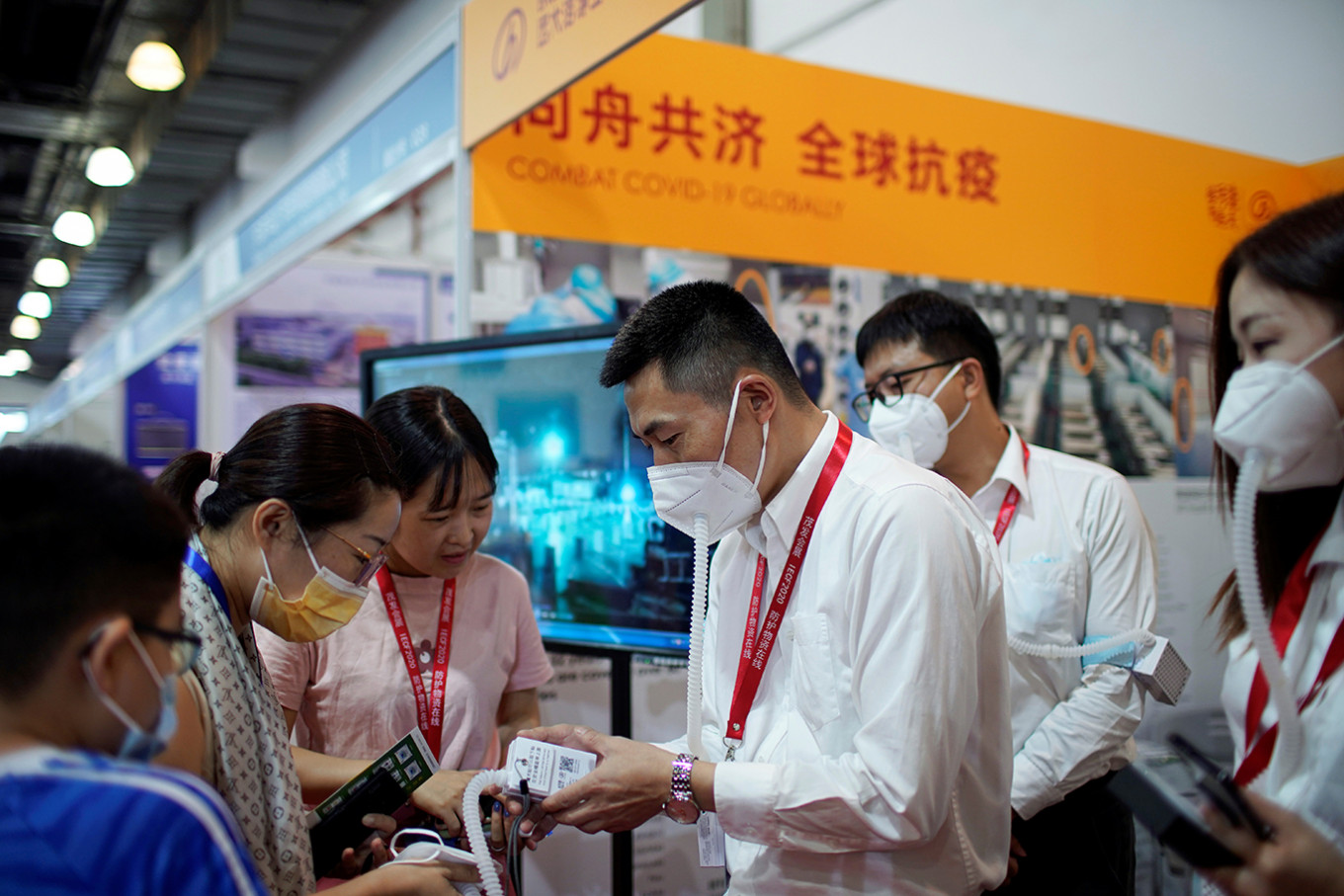Popular Reads
Top Results
Can't find what you're looking for?
View all search resultsPopular Reads
Top Results
Can't find what you're looking for?
View all search resultsChina expands state jobs for graduates as coronavirus hits private sector
Change text size
Gift Premium Articles
to Anyone
 People wearing face masks visit a mask stall at a procurement fair for epidemic-prevention materials in Shanghai following the COVID-19 outbreak, China July 22, 2020.China's thousands of state-owned enterprises, local governments, and public institutions are expanding hiring as a record number of students graduate into a job market left reeling by the COVID-19 pandemic. (REUTERS/Aly Song)
People wearing face masks visit a mask stall at a procurement fair for epidemic-prevention materials in Shanghai following the COVID-19 outbreak, China July 22, 2020.China's thousands of state-owned enterprises, local governments, and public institutions are expanding hiring as a record number of students graduate into a job market left reeling by the COVID-19 pandemic. (REUTERS/Aly Song)
C
hina's thousands of state-owned enterprises, local governments, and public institutions are expanding hiring as a record number of students graduate into a job market left reeling by the COVID-19 pandemic.
Around 8.7 million Chinese students are graduating this year, almost half a million more than last year, heading into an uncertain future as private firms rein in recruitment.
Job stability for the young is a longstanding political concern in China. President Xi Jinping, who has previously warned that struggling graduates could "turn into negative energy," is urging more hiring.
Graduates, who generally enter the workforce in June or July, face a "severe" situation, officials have said. Available positions for them in the recent pre-graduation spring recruiting season fell by 22% on year, according to BOSS Zhipin Research.
While China's GDP bounced back into growth in the second quarter, surveyed unemployment of graduates aged 20-24 was more than three times the rate for the broader population, rising to 19.3% in June, 2.1 percentage points higher than May.
State-owned enterprises, local governments, and public institutions, known collectively as "the system", are responding to Xi's call.
Oil giant Sinopec Corp is more than doubling its 2020 recruitment numbers, with an additional 3,500 positions for new graduates.
In Henan province, provincial SOEs have been told to expand hiring and reserve at least half the new positions for graduates.
"Clearly, initiatives such as this run counter to the idea that China's SOEs are run on a purely commercial basis," said Louis Kuijs, of Oxford Economics. SOEs, which enjoy privileged access to certain sectors, have a "special responsibility" at times, he said.
Government schemes sending young people to work in less developed areas of China have also been bulked up: one, where graduates help with poverty alleviation and other community support, has 5,000 more places than last year.
Thousands more graduates than in 2019 will be granted passing grades in the highly competitive civil service exams, mainly held in the summer. Central Hubei province has increased its quota by more than 40%, while the northern region of Inner Mongolia has more than quadrupled its quota.
Efforts to directly soak up labor are limited as China's private sector accounts for 80% of urban jobs. But SOEs have also been told to help employment indirectly by promptly paying and reducing costs for smaller companies, said Andrew Polk, a partner at Trivium China, a research advisory.
SOEs have been pivotal in driving China's supply-led economic recovery amid the pandemic, although demand has not kept up, Polk said.
Pros and cons
In a letter dated July 7 to graduates embarking on grassroots work in the far western region of Xinjiang, Xi said he wanted degree holders to "contribute more to the (Chinese Communist) Party, the motherland and the people."
Coveted jobs in "the system" can provide security, status and help getting a more desirable "hukou," a residential permit linked to access to local public services.
"Nothing is more important than stability," said Joanna Yu, an applicant for the civil service examination in Shandong province.
Jiang Zhenxin, who graduated this year, will spend two years working in county-level government in southern Guangdong province.
"As a Party member, working in the municipal committee is a way to serve the people," said Jiang.
But the bureaucratic life is not as comfortable as it used to be. Previous perks like gifts from local businesses have been cracked down on amid a years-long anti-corruption campaign.
And advancement for ambitious cadres has also slowed, likely to better protect the middle-aged officials who are key supporters of Xi, said Jerome Doyon, a lecturer at Oxford University.
"Now is not an ideal time to be a young official in China," he said.









